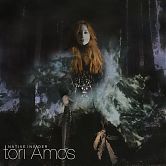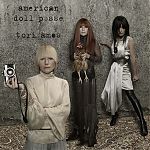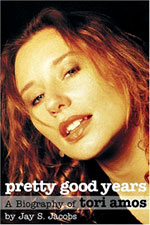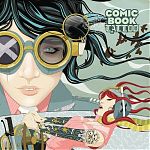- Articles
- Cherries
- Minutiae
- Q&A
- RAINN
- Releases
- Reviews
- Site News
- Them
- Toriphiles
- Touring
- TV/Radio/Web
- Video
News Archives
Keep an eye on our Twitter and Facebook pages since we often post quickie updates there when we're on-the-go.
During tours, we do our best to cover setlists in real-time on Twitter. If you want to tweet a show in, just DM or @ us on the day and tell us to watch your stream that night.
Tori is touring in 2017 to support the release of Native Invader. The European legs runs from early September through early October and the North American leg runs from late October to early December. We do not know if additional dates elsewhere will be added.

Native Invader (album, 2017)

Unrepentant Geraldines (album, 2014)

Gold Dust (album, 2012)

Night of Hunters (album, 2011)

Midwinter Graces (album, 2009)
 Abnormally Attracted To Sin (album, 2009)
Abnormally Attracted To Sin (album, 2009)
Live at Montreux 1991/1992 (DVD, 2008)

American Doll Posse (album, 2007)

A Piano (boxed set, 2006)

Pretty Good Years
(bio, 2006)

Fade To Red
(DVD, 2006)
 Comic Book Tattoo (book, 2008)
Comic Book Tattoo (book, 2008)News: Salon Interview (September 20, 2011)
If [the masters and I] make a new being together, these dead guys and this live woman — then the woman has to be the one who permeates the seed. That’s how it’s got to work. That was kind of sexy, I thought. These dead guys started coming very much alive in my life. I walked with their ghosts and immersed myself in their work. And they would guide me and scream at me and all kinds of things.
Tori spoke to Annie Zaleski for Salon magazine and their interview went up on their website today. Their conversation covered everything from relationships to plans for the upcoming tour to, of course, the record itself.
This is a good discussion and definitely worth the read.
Tori Amos lightens up
As her new classically inspired album arrives, the alt-rock chanteuse looks back — and wishes she’d laughed more
By Annie Zaleski
Tuesday, Sep 20, 2011 12:21 ET
Tori Amos has never shied away from structural or narrative rigor. Since her 2001 covers album “Strange Little Girls” — a collection of male-penned/performed songs reimagined from the perspective of a woman — the 48-year-old pianist has favored increasingly complex albums revolving around scholarly concepts. 2002’s “Scarlet’s Walk” ruminated on post-9/11 America and Native American history, while 2005’s “The Beekeeper” was influenced (and informed) by the Gnostic gospels, the sacred significance of bees and biblical themes. “American Doll Posse,” meanwhile, a 2007 album, featured songs performed by five distinct characters derived from Greek goddesses, all of whom embodied a different facet of Amos’ personality.
Amos’ 12th and latest solo album, “Night of Hunters,” might be her most ambitious project yet. Her first for the renowned classical music label Deutsche Grammophon, Amos calls it a “21st-century song cycle” steeped in the classical music tradition of variations on a theme. Using compositions by Franz Schubert, Felix Mendelssohn and Claude Debussy as a foundation, Amos and collaborators — among them, the Apollon Musagète string quartet and the Berlin Philharmonic’s principal clarinetist, Andreas Ottensamer — mold the music into a vibrant, striking orchestral achievement.
“Night of Hunters’” lyrical ambition matches its music. Set in Ireland, the album focuses on a female protagonist whose relationship has dissolved. Using elements of ancient Irish mythology — including the psychological advantage wielded by poets in the face of violent enemies — and the knowledge of a shape-shifting creature named Anabelle (whose parts are sung on the album by Amos’ daughter, Natashya), the protagonist sifts through the wreckage of their union. In doing so, she gains enough knowledge to reclaim her personal power and remember the depth of the relationship.
Amos expounded on these ideas while calling from Los Angeles yesterday afternoon, where she said she had just spent time with former KCRW DJ Nic Harcourt. In the initial minutes of our conversation, Amos proclaims that she’s “very married” — although she laughs that “people have been asking me about that a lot.”
Have they been asking about your marriage because of your new record?
Yeah, they’ve been asking me. Nic just asked me: “It sounds like you’re speaking from experience, all the shattering and pain.” I said, “Well, I’ve been married a long time. A lot goes on.”
Relationships are work; things ebb and flow.
They are work. But I don’t mind work. It’s not a pejorative.
If the person is worth it and the relationship is worth it, the work is valuable.
Completely. Completely. With so much happening out in the world — all the demands and all the drama that seems to go on even just having the next generation of nieces and nephews and kids — there’s always something going on. Sometimes you think, “Is there any time for us to just be alone?” I think sometimes all the pressure comes from the outside — not necessarily from the two of you, but it works its way in unless you figure out how to communicate and how to carve out time for the two of you to have some romance.
As an artist, how do you make the decision what needs to be personal and private for you, and what you want to share with people?
If you don’t give complete and total details of something, then you’ve protected people. It’s a very fine line, exposing things that happen in your personal life. But what is your personal life? When we’re touring so much and we’re out there traveling, then life is happening while the music is going. I don’t separate, really, the art and the life. I can’t separate that. But what I can do is try and protect the circumstances sometimes, if you see what I’m saying. As far as husband [Mark Hawley] goes — he knows he’s a muse. He’d rather it be him than somebody else, I think! And he’s British, so they’re a strange fish. He’s amused by the fact that he’s a muse, I think. He finds it funny, in a very strange way. And he’s involved in his motorbikes and all of that stuff. If I’m exposing us, as long as we’re OK, he’s fine. As long as I come in with the skirt and the high heel, he’s fine. [laughs]
It’s almost surprising you haven’t done an album so steeped in the classical tradition before. Why now?
Well, Deutsche Grammophon approached me. What I’ve kind of learned is you really don’t approach them. It’s one of those strange things — tracking [former Universal Musical Group chairman/CEO-current Sony Music Entertainment chairman/CEO] Doug Morris down in the world is one of my favorite pastimes. [laughs] I run into him on the streets of New York or whatever. You can approach him, but you don’t sort of sit on the steps in Berlin of Deutsche Grammophon and say, “Hi, I have an idea. I’m from the pop world, will you let me in?” [laughs] They find you. Sort of like the Black Ops; they track you down. And they did.
I had left Universal — I had finished my contract — and within two weeks, [Deutsche Grammophon] tracked me down. They said, “We have this idea — and the idea is for you to do a 21st-century song cycle based on classical themes.” My head just started pounding, and I thought, “This is a very, very demanding work you’re talking about.” And honestly, if you get something like that wrong — you just want to go be a Hobbit and crawl under a rock and get hairy feet. You could never buy shoes in public again.
With a project like this, it’s not just the pop critics weighing in; you’d have the classical critics scrutinizing as well. And they speak their own language and have their own lexicon.
Well, yes, and you don’t want to do it in a cliché way. If you’re going to take it onboard, I think you really have to approach it like an architect, a sonic architect. You have to use your compositional skills. Variations on a theme are part of their tradition, but you can get it all wrong if the impression is you’re just messing with the masters, instead of having a tight concept. And my concept was, as the woman from the 21st-century, if I permeate — if we make a new being together, these dead guys and this live woman — then the woman has to be the one who permeates the seed. That’s how it’s got to work. That was kind of sexy, I thought. These dead guys started coming very much alive in my life. I walked with their ghosts and immersed myself in their work. And they would guide me and scream at me and all kinds of things. [laughs]
How did you feel pushed as a musician and a writer as you were creating the record?
Once you start studying the form, every single one of them — whether it’s [Franz] Schubert or [Erik] Satie or whomever we’re talking about — once you start studying it, listening to it, looking at the notes on the page, I almost would go into a trance with it. You take it to a spiritual place; you have to go immerse yourself in it. The idea isn’t to interpret it — that’s what classical pianists do, that’s their job. That’s not my gig, that’s not what I’m trying to do. What I’m trying to do is make a new form with their motif and tell a different story. It is about listening, and it is about building and narrative and all those things. Working on the musical [“The Light Princess”] for so long, over five years now, has sort of drummed into me certain key components: motivation for characters, arc of a story, that kind of thing.
The characters in the song “Battle of Trees” fought using words as a weapon, based on an idea in ancient Ireland that the poet had so much power. The idea that words have devastating power — that’s such a liberating and exuberant idea to explore. How does that resonate within you personally?
I was reading “The White Goddess” by Robert Graves, [a book] that really investigates the mythology from ancient Ireland. When I read about the power of the poets in those days, it took me a while to really comprehend that sort of world, because we don’t have a world like that. It’s almost going to an alien world where that exists. It excited me, but to get my head around the prose was tricky. That took quite some time, to deal with “Battle of Trees.” Probably the longest of everything — it was being worked on through this whole process, when I was building all the other works, this was constantly on the drawing board.
I love that your daughter sings the part of Anabelle on the record. What sort of guidance did you give her from a musical and personal perspective?
We were giving each other things. She had ideas about Anabelle as a character; she’s an actor first, music person second. She’s grown up with music — it’s in her blood, obviously. But she’s been acting for many years now, and I think she approached it in that way, who Anabelle should be. She had friends all over the world that were dealing with divorces, and she would say, “Why do grown-ups wait so late to fix their problems?” [laughs] I said, “Wow, I don’t know.” She said [Amos affects a British accent], “Mummy, quite frankly, it’s quite stupid.” [laughs] We were developing Anabelle together, and I think she said to me, “Who’s playing Anabelle? You know I am, right?” [laughs] I didn’t even want to have that argument. I thought that our relationship would come through, there would be an honesty. I knew I wanted my niece to be the Fire Muse, because she’s 19 and she’s been training for many years particularly on the vocal side, she’s on the legitimate music side. I liked the idea of having these two beings I know very well.
You’re going to have a string quartet along on your upcoming tour dates. What’s the most exciting part of having that extra instrumentation along?
The exciting thing is that they come from a different world; they really come from the classical world. When I’m saying to them, “OK, we need to learn ‘Precious Things,’ and they’re excited, but it’s a very different kind of structure and rhythm. It comes from a different place than what they’re accustomed to — although certain styles cross, because I have a lot of that in my blood, it seeps out in the music. But we are rearranging some songs in the catalog that were never string quartet- or string-based. That’s exciting, to shake it up and do things that were maybe drum ‘n’ bass, rhythm-driven. Not all things; just a couple. But I thought, “If we’re going to do this, we need to just not be predictable.”
Can you reveal any particular songs you are redoing?
I’ll tell you what we’re hoping to do, which is down the road. We’d love to do a version of “God,” I think that would be really fun, because that was very rhythmic. We have “Precious Things” planned — we won’t have it the first night, we just won’t. But we’re planning to do it. And we’re planning to do a version of “Spark,” that would be quite different.
Speaking of “Precious Things”: “Little Earthquakes” came out 20 years ago. What advice and insight would you give to the Tori Amos of that era now?
Oh … God. I would tell her to be in the moment and to dance with it. And find the humor. That girl needs to laugh more. [laughs]
Isn’t that true of all of us when we were younger? We were so serious.
I know! It’s true. But that’s what I would tell myself: “Please laugh more.”


